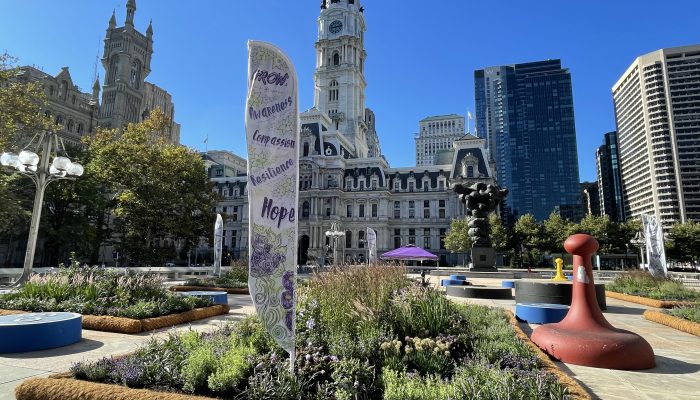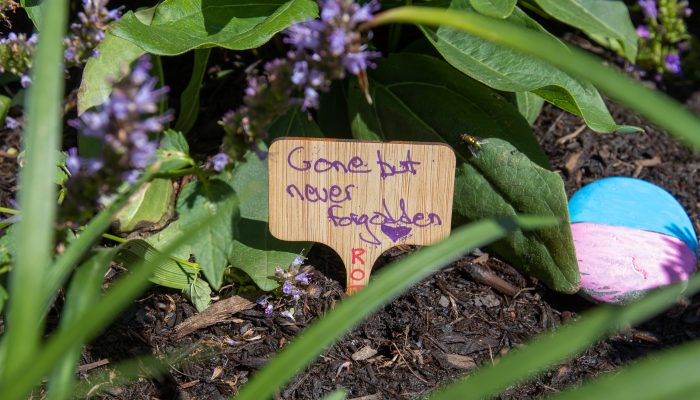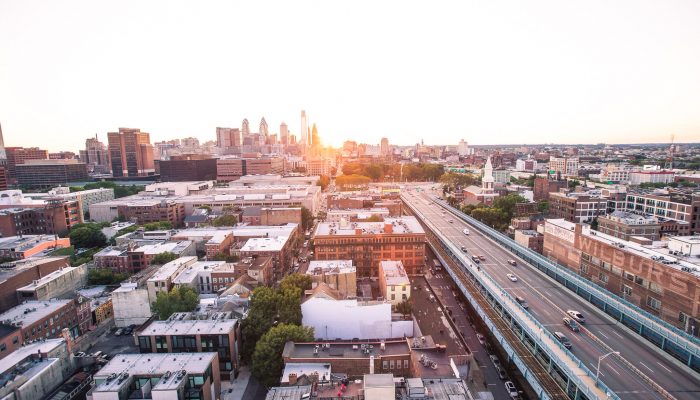In 2021, overdose rates continued to rise across Philadelphia and disproportionately impact Black and Brown communities. The data released this month serves as a reminder that the fight against the opioid epidemic is not over. The City remains committed to reducing the impact of the opioid epidemic for all communities who are affected.
The Opioid Response Unit (ORU) focuses on preventing and treating substance misuse, and helping impacted communities recover by ensuring City departments operate within a unified strategy, share resources and work together to respond to the overdose crisis.
The ORU convenes four interagency strategy groups: Community Support, Prevention, Public Safety, and Treatment. Each strategy group works on multiple strategic initiatives to address our short and long-term goals in responding to the overdose crisis.
The following strategic initiatives are designed to be implemented by each Strategy Group over the next five years, with annual, evolving goals that reflect current overdose-related trends.
The below chart updates from the ORU strategy workgroups for this quarter, driven by the 2022 Action Plan.
Community Support Strategies
| Strategic Initiative |
2022 Goals |
Update |
| Develop holistic and trauma-informed engagement program for communities, families, and individuals impacted by opioid use disorder |
|
- The Philly HEALs program, operating out of the Philadelphia Department of Public Health’s Substance Use Prevention and Harm Reduction Division offers bereavement outreach/crisis counseling, formal grief counseling for adults and children, and peer support groups for Philadelphia residents that have suffered a substance use related loss.
- The DBHIDS Community Wellness Engagement Unit (CWEU) continues its partnership with Concilio, a local human services provider, to triage supports and offer family based services & supplemental supports via their Family Navigator, along with Philadelphia Systems of Care.
- CWEU has partnered with PDPH’s COVID-19 Resource Hub program to connect residents to wellness resources and enhance community awareness, starting at Mi Salud Wellness Center in Feltonville. CWEU support includes resource drop offs and community health events.
|
| Scale Housing First/Permanent Supportive Housing in opioid hot-spot neighborhoods |
- Complete a 100 Day Challenge (100DC) to achieve targeted, specific goals related to homelessness in the Kensington area.
- The 100 Day Challenge will include, but will not be limited to, evidenced-based reentry programming, dedicated shelter space for couples, housing vouchers, supportive housing for recovery, transportation, and nursing support.
- Increase housing availability and related shelter services, by both type and location.
|
- The City completed a 100-Day Challenge between March 28 to July 24, 2022. In total, 377 people in Kensington were connected to housing and/or behavioral health treatment services.
- 171 people were placed in housing opportunities.
- 282 people enrolled in behavioral health treatment, 84 of whom also received wound care services.
- 141 additional housing opportunities came online as a result of the 100 Day Challenge, including couples’ housing.
- Through the 100 Day Challenge, treatment and housing providers strengthened the connections between residential drug treatment, recovery, and permanent housing.
|
| Expand employment (including youth) and other programs in hotspot neighborhoods |
- Increase Same Day Work and Pay participants by providing additional opportunities through expanded CLIP and Project REACH programming
|
- The fiscal year 2023 budget includes a funding extension for the Same Day Work and Pay Program. Managing Director’s Office (MDO) Community Services is working with the Office of Community Empowerment and Opportunity (CEO) on the implementation of the program’s strategic planning.
|
| In coordination with the Public Safety Strategy Group, pursue permanent closure of drug corners and activation of community spaces in hotspot neighborhoods |
- Support residents in improving quality of life
- Improve the physical condition of opioid-affected communities
|
- The Philadelphia Police Department’s East Division partnered with the City of Philadelphia’s Parks and Recreation to provide public safety support at Kensington-area parks during summer and fall family-oriented programming.
|
Prevention Strategies
| Strategic Initiative |
2022 Goals |
Update |
| Reduce overdoses and increase harm reduction |
- Expand harm reduction resources into hotspots outside of Kensington
- Ensure communication around harm reduction is culturally competent and meets the needs of unique individuals
- Offer supportive services to families impacted by substance use
|
- The Philadelphia Department of Public Heath’s Substance Use, Prevention and Harm Reduction Division (SUPHR) is planning to install a second Naloxone Tower at 60th and Market, in partnership with SEPTA.
- In an effort to reach more communities outside of the Kensington area, SUPHR has organized harm reduction outreach at libraries across North Philadelphia. In addition, the Opioid Response Unit has provided targeted substance use awareness trainings for adults working with disproportionately high risk populations, including juvenile justice professionals, DHS staff, and local supermarkets.
- SUPHR’s communications team is launching a new fentanyl test strip education campaign, as well as a bilingual PSA on xylazine, in partnership with Kensington-area businesses.
- PDPH’s Philly LIFTS (Neonatal Abstinence Syndrome Program) works to expand engagement for parents prior to birth and pre-discharge from the hospital, and has established relationships at eleven local hospitals.
|
| Scale Emergency Medical Services Alternative Response Unit |
- Expand AR-2 Operational Hours
- Expand AR-2 Geographic Footprint
|
- Philadelphia Fire Department’s Alternative Response Unit 2 (AR-2) pairs behavioral health professionals with paramedics in a marked EMS SUV. AR-2 currently serves as a supplemental service to non-fatal street-level overdoses in East Division and provides leave-behind Narcan, active outreach in the neighborhood, and has the capacity for SUD assessments and warm handoffs to treatment out of an RV.
- AR-2 operates 7 days a week, from 9 a.m. to 6 p.m., and is increasing its follow-up services post-treatment for served individuals.
|
Public Safety Strategies
| Strategic Initiative |
2022 Goals |
Update |
| In coordination with the Community Support Strategies Group, pursue permanent closure of drug corners and activation of community spaces in hotspot neighborhoods |
- Create safe spaces with enforcement of curfew, no camping, and no outdoor drug use at all in community parks in Kensington, Harrowgate, and Fairhill
- Support Parks and Recreation Summer Programming at Play Parks, Swim Philly, and Play Streets
|
- Parks and Recreation, the Managing Director’s Office, Impact Services, New Kensington CDC, and the Free Library of Philadelphia worked together to schedule consistent summer and fall programming at McPherson Square Park, Harrowgate Park, and Hissey Playground, with support from police, Community Life Improvement Program, and the Health Department’s Project Reach team.
- In Summer 2022, parks programming in Kensington included PlayParks activations, SwimPhilly at Scanlon and McVeigh, and 18 PlayStreets. Seven Literacy & Playful Learning PlayStreets received programming support thanks to Fab Youth Philly Play Captains and Free Library of Philadelphia.
|
| Scale Police-Assisted Diversion (PAD) with co-responders |
- Expand PAD to Northeast Police Division with mobile behavioral health supports concentrated in the 15th Police District
|
- Police Assisted Diversion (PAD) expanded operations by 25% adding services in the East Police Division.
- In FY23, PAD will expand into the Northeast Police Division, with a focus on the 15th Police District.
|
| Improve coordinated narcotics strategy between local, state, and federal agencies |
- Pilot diversion courts in East Division
|
- The Office of Violence Prevention’s Group Violence Intervention model has expanded to six new police districts and will expand to operate in all police divisions citywide and host a minimum of five group call-ins over the course of this fiscal year.
- The Accelerated Misdemeanor Program (AMP) resumed operation in the East Division in August 2022. As of September 28, the District Attorney’s Office has diverted 288 cases to AMP.
|
Treatment Strategies
| Strategic Initiative |
2022 Goals |
Update |
| Execute Medication First policies, expand Medication Assisted Treatment (MAT) provision and provider incentives and expand access to treatment |
- Enhance access to existing treatment systems
- Support Recovery Houses to become licensed through the PA Department of Drug and Alcohol Programs (DDAP)
|
- In 2022, all 24 Department of Behavioral Health and Intellectual disAbility Services (DBHIDS) contracted recovery houses are now fully licensed.
- DBHIDS issued a Request For Proposals (RFP) to provide funding for physical plant upgrades to currently operating Recovery Houses in Philadelphia who are not contracted with DBHIDS.
|
| Expand mobile medication assisted treatment initiatives |
- Develop and implement a Mobile Methadone Maintenance Treatment Program, with the goal of transitioning individuals to a clinic to preserve capacity to serve new patients seeking care
|
- DBHIDS is actively working on a plan to launch Mobile Methadone Maintenance Treatment.
|
| Expand Warm Handoff Program, including following incarceration |
- Develop warm handoff culture across systems
|
- DBHIDS recently received a grant to connect individuals being discharged from Philadelphia Department of Prisons (PDP) to receive support from Certified Recovery Specialists.
|




